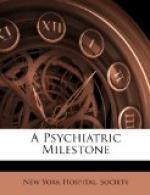Allow me, in the first place, to present you with the best wishes of the French Government who have had the kindness to charge me to interpret the sentiments of sympathy which they feel for all manifestations tending to render the relations that unite our two countries closer and more fruitful. The Academy of Moral and Political Sciences has equally charged me to assure you that it is happy to be represented by one of its members at the commemoration of the centenary of Bloomingdale Hospital that has so brilliantly and generously continued the tradition of Pinel and Esquirol. The Academy takes a lively interest in the psychological and moral studies of this Congress that seek the cure of diseases of the mind and the lessening of mental disorders. The Medico-Psychological Society, the Society of Neurology, the Society of Psychology, the Society of Psychiatry of Paris are happy to take part in these festivals and are desirous of associating still more closely their work to that of the scientific societies of the United States.
The celebration of the centenary of a lunatic asylum gives birth to-day to a national festivity in which all civilized nations participate. This is a fact that would have well astonished the first founders of lunatic asylums, the Pinels, the Esquirols, the William Tukes, and the first organizers of Bloomingdale. The public opinion respecting the diseases of the mind, the care to be given to lunatics, is vastly different to what it was a century ago. This transformation of ideas has taken place, in a great measure, as a result of the studies devoted to neuroses and that is why it seems to me interesting to present you to-day with a few reflections on the connections which unite neuroses and psychoses; for it is the discovery of these connections that has shown to the man sound in mind, or who imagines himself to be so, how near he always was to being a lunatic and how wise it was always to consider the lunatic as a brother.
Formerly a lunatic was considered as a separate being, quite apart from other members of society. The old prejudices which banished the patient from the tribe as a useless and dangerous individual had diminished no doubt with respect to the diseases of the body, which were more and more regarded as frequent and natural things to which each of us might be exposed. But these prejudices persisted with respect to some sexual diseases that were still considered ignominious and chiefly with respect to diseases of the mind. No doubt some intelligent and charitable physicians took interest in the lunatic, endeavored to spare him many sufferings, to defend him, to take care of him. But the people feared the lunatic and despised him as if he had been struck by some malediction which excommunicated him. I have seen lately a patient’s parents upset with emotion, as they had to cross the gardens of the asylum to visit their daughter, at the single thought that they might catch sight of a lunatic. This individual, in fact, had lost in the eyes of the public the particular quality of man, reason, which, it appears, distinguishes us from beasts; he seemed still living, but he was morally dead; he was no longer a man.




